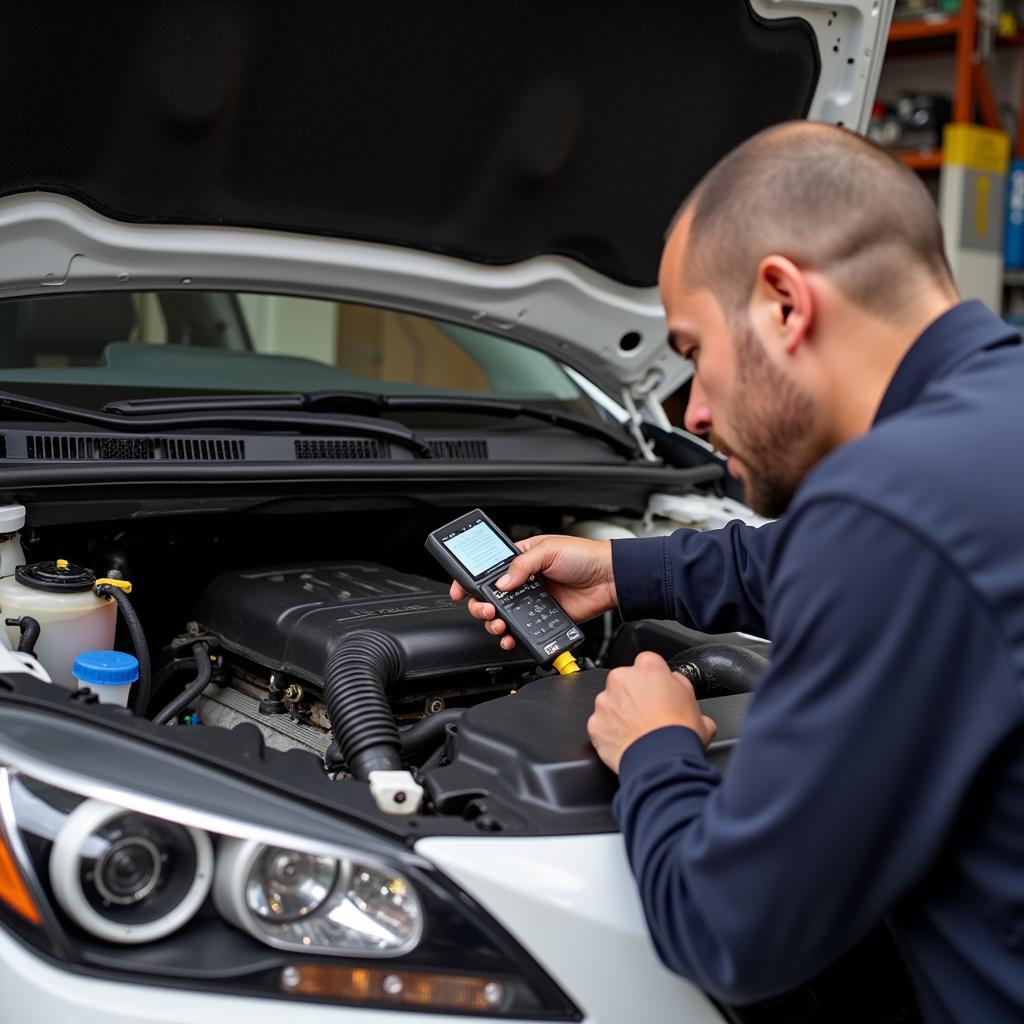Automatic cars offer unparalleled driving convenience, but like any complex machine, they’re prone to issues. Understanding these “Common Problems With Automatic Cars” empowers you to address them proactively, ensuring a smoother, safer driving experience. Let’s delve into the intricacies of automatic transmission issues and their potential solutions.
One common problem with certain car models is transmission issues. For example, you can learn more about problems with the GM 6-speed transmission in the Buick car on our website.
Common Culprits Behind Automatic Transmission Problems
Several factors can lead to hiccups in your automatic transmission system. Identifying the root cause is crucial for effective troubleshooting.
1. Low Transmission Fluid
Symptoms: Slipping gears, rough shifting, and delayed engagement.
Explanation: Transmission fluid lubricates, cools, and facilitates smooth gear changes. Low fluid levels hinder these functions, leading to performance issues.
Solution: Regularly check and top up your transmission fluid as per your car manufacturer’s recommendations.
2. Worn Out Transmission Fluid
Symptoms: Similar to low transmission fluid, but often accompanied by a burnt smell.
Explanation: Over time, transmission fluid degrades, losing its lubricating and heat-dissipating properties. This accelerates wear and tear on transmission components.
Solution: Adhere to your car’s recommended transmission fluid change intervals. Typically, this involves a flush and refill every 30,000 to 60,000 miles.
3. Faulty Solenoids
Symptoms: Erratic shifting, inability to shift into specific gears, and the “check engine” light illuminating.
Explanation: Solenoids are electro-hydraulic valves that regulate fluid flow within the transmission. Malfunctioning solenoids disrupt this precise control, resulting in shifting problems.
Solution: A qualified mechanic can diagnose faulty solenoids and replace them.
4. Worn Clutch Packs
Symptoms: Slipping gears, particularly during acceleration, and a noticeable shuddering sensation.
Explanation: Clutch packs engage and disengage gears within the transmission. Wear and tear on these friction plates compromise their grip, leading to slippage.
Solution: Replacing worn clutch packs requires specialized tools and expertise. Seeking professional assistance is highly recommended.
Beyond the Transmission: Other Common Automatic Car Issues
While transmission issues often take center stage, several other components in automatic cars can cause headaches:
1. Electrical Gremlins
Modern automatic cars heavily rely on intricate electronic systems. Sensors, wiring harnesses, and control modules can malfunction, leading to a range of issues.
Example: A faulty throttle position sensor can send incorrect signals to the transmission control unit (TCU), causing erratic shifting or acceleration problems.
2. Vacuum Leaks
Vacuum leaks, while less common in modern cars, can disrupt the operation of various systems, including those related to automatic transmission.
Example: A vacuum leak affecting the modulator valve can disrupt the transmission’s ability to shift smoothly.
 Mechanic Performing a Vacuum Leak Test on a Car Engine
Mechanic Performing a Vacuum Leak Test on a Car Engine
3. Sensor Malfunctions
Automatic transmissions rely on an array of sensors to function correctly. These sensors provide crucial data to the TCU, enabling precise gear changes.
Example: A malfunctioning speed sensor can mislead the TCU about the vehicle’s speed, leading to improper gear selection.
4. Mechanical Wear and Tear
Like any mechanical system, components within an automatic transmission are subject to wear and tear. Over time, parts like bearings, gears, and seals can degrade.
Example: Worn-out bearings can introduce excessive play and friction, leading to noise, vibration, and ultimately, transmission failure.
You might be interested in learning about common problems with manual transmission cars as well.
Proactive Maintenance: Your Key to Longevity
Timely maintenance plays a pivotal role in preventing common problems with automatic cars. Here’s a rundown of essential maintenance practices:
- Regular Fluid Checks and Changes: Adhere to your manufacturer’s recommended intervals for transmission fluid checks and changes.
- Address Leaks Promptly: If you notice any fluid leaks beneath your car, address them immediately to prevent further damage and costly repairs.
- Gentle Driving Habits: Avoid aggressive driving practices such as sudden acceleration and hard braking. These can put unnecessary stress on the transmission.
- Regular Inspections: Schedule regular inspections with a qualified mechanic specializing in automatic transmissions.
Expert Insight: “Prevention is always better than cure. Regularly scheduled maintenance and prompt attention to warning signs can significantly extend the lifespan of your automatic transmission.” – John Miller, Automotive Engineer
Don’t Let Transmission Troubles Take the Wheel
By understanding the intricacies of automatic transmissions and embracing proactive maintenance, you can ensure a smoother, more enjoyable driving experience for years to come. If you encounter persistent issues, don’t hesitate to seek professional assistance.
We understand that dealing with car problems can be a hassle. If you’re experiencing any issues with your automatic car, or if you’d like to learn more about maintaining your vehicle, feel free to reach out to us.
Contact AutoTipPro at:
Phone: +1 (641) 206-8880
Office: 500 N St Mary’s St, San Antonio, TX 78205, United States
We’re here to help you get back on the road with confidence.
Frequently Asked Questions (FAQ)
1. How often should I check my automatic transmission fluid?
It’s generally a good practice to check your transmission fluid level at least once a month.
2. What are the signs of a failing automatic transmission?
Common signs include slipping gears, rough shifting, delayed engagement, a burning smell, and unusual noises.
3. Can I drive my car with a slipping transmission?
It’s highly discouraged to drive with a slipping transmission as it can lead to further damage and potentially leave you stranded.
4. How much does it cost to replace an automatic transmission?
The cost can vary widely depending on the make and model of your car, as well as labor costs in your area.
5. Can I prevent automatic transmission problems?
While not all problems are preventable, adhering to a regular maintenance schedule and adopting gentle driving habits can significantly reduce the risk of issues.






Leave a Reply